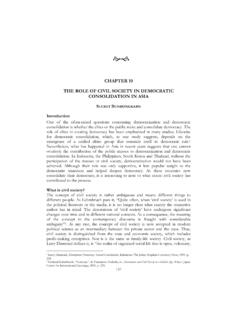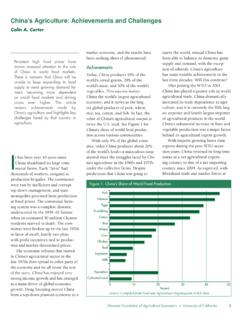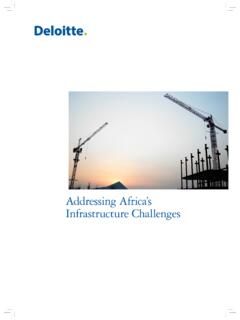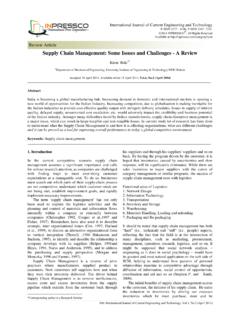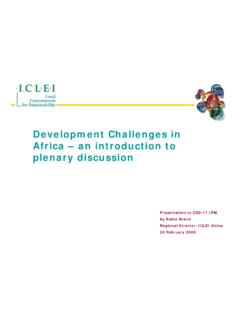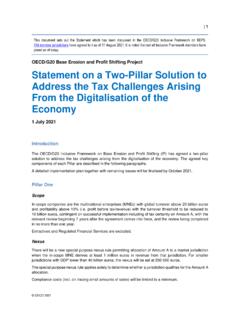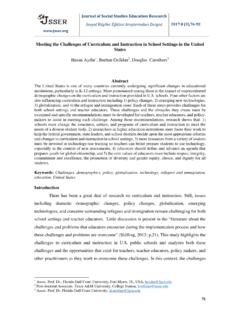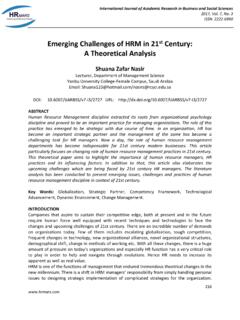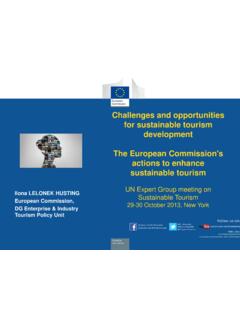Transcription of THE PROBLEMS AND POTENTIAL OF THE PACIFIC ISLANDS …
1 THE PROBLEMS AND POTENTIAL OF THE PACIFIC ISLANDS FORUMERICSHIBUYAINTRODUCTIONThe PACIFIC ISLANDS Forum (PIF) can be justifiably proud of much of itsaccomplishments as a regional organization. Since its founding in 1971, the PIF (formerly the South PACIFIC Forum, and usually referred to simply as the Forum ) has been the major avenue for the small island states of Oceania to assert a collective voice on major international issues, thereby amplifying theirvoice and impact. It has been through the Forum that positions on nucleartesting, climate change, fisheries, and other security and/or environmental issues have been articulated and pushed in the international arena.
2 The pattern of cooperation developed among the countries in Oceania is well establishedand should provide many lessons for other regions. On the other hand, many critics view the Forum as an example of unrealized POTENTIAL , of an organization of endless (and useless) discussion, where talk has replaced actionas the measure of effectiveness. The Forum, it is argued, has refused to take the next step in its evolution, from regional organization to regional chapter will weigh the prospects for the development of a regionalcommunity. It will trace the historical development of cooperation in Oceaniaand the evolution of the Forum as an actor in regional and internationalpolitics.
3 The structural and institutional obstacles to the Forum s development beyond a regional organization towards a regional community will then be articulated, with some concluding remarks on the future of the Forum and its POTENTIAL COLONIAL CONTRIBUTION IN DEVELOPING REGIONAL COOPERATION IN OCEANIA Greg Fry has accurately noted, the full story of South PACIFIC regionalcooperation be told solely as the history of the Forum in the way one might equate South-East Asian cooperation with Much of the narrative should in fact be concerned with the politics of relations between102 ERIC SHIBUYA103regional institutions and the political interests they represent.
4 1 The accomplishments of the Forum have often been credited to its overarching philosophy of the PACIFIC Way . Michael Haas has called the PACIFIC Way a system of unanimous compromise, where everyone sacrifices something for the overall benefit of the whole and all decisions are made by many government officials have ascribed to the PACIFIC Way a legacy extending to precolonial, precontact times, its actual development is more accurately traced to the aftermath of World War II. The colonial powers of the region (the United States, France, the Netherlands,3 United Kingdom,4 Australia and New Zealand) organized a South Seas conference in 1947 and developed an organization for the welfare of their holdings.
5 The organization was called the South PACIFIC Commission (SPC, or simply the Commission) and it was designed to provide technical advice on economic and social of political issues remains strictly prohibited under the SPC s charter, and meetings originally only included the administering powers of the region. Representatives from the ISLANDS met with the administering powers triennially at the South PACIFIC Conference where the ISLANDS were able to make their views known about policies initiated by the SPC, but this was almost inevitably after the fact. (Meetings of the Commission and Conference did not even take place at the same time in the years the Conference met).
6 When Western Samoa became independent in 1964, a question arose as to where it should be placed should it remain in the Conference (and essentially have no voice) or become a full member of the Commission? The eventual decision was to give Western Samoa membership in both organizations, but this led to questions for the future. Concern rose that the remaining ISLANDS would seek independence too soon in order to gain full membership into the Greg Fry, International Cooperation in the South PACIFIC : From Regional Integration to Collective Diplomacy, in W. Andrew Axline ed., The Political Economy of Regional Cooperation(London: Pinter, 1994), 2 Michael Haas, The PACIFIC Way: Regional Cooperation in the South PACIFIC (New York: Praeger, 1989).
7 Cook ISLANDS Prime Minister Albert Henry coined the term in 1975. 3 The Netherlands would leave the SPC when it relinquished control of Netherlands New Guinea (West Papua/Irian Jaya, subsequently integrated into Indonesia) in 1962. 4 The United Kingdom withdrew from the SPC in 1996 but rejoined in 1998. 5 The organization is now known as the Secretariat for the PACIFIC Community, and the acronym obviously is unchanged. 6 Herbert Corkran, Mini-Nations and Macro-Cooperation: The Caribbean and the South PACIFIC (Washington : North American International, 1976), THE PACIFIC ISLANDS FORUM104 The no politics restriction on discussion in the SPC was the source of great dissatisfaction for the nascent leadership from the ISLANDS .
8 The most pressing issues for the ISLANDS were clearly political ones involving larger questions of decolonization, but the greatest concern was nuclear testing by Matters came to a head at the 1965 meeting in Lae, Papua New Guinea, when Ratu Sir Kamisese Mara of Fiji led a major push from the island representatives to give the Conference more relevance in the actions of the SPC beyond its existing advisory capacity. The Lae Rebellion was the first concerted effort by PACIFIC Islanders to protest against the structures in the SPC which ensured dominance by the colonial powers.
9 8 Mara was also the driving force behind the creation in 1965 of the first indigenously motivated ISLANDS -only regional organization, the PACIFIC ISLANDS Producers Association (PIPA). Formed by Fiji, Tonga, and Western Samoa outside of the domain of the SPC, PIPA provided a unified front for negotiating the prices of common agricultural products for export. Faced with increasing irrelevance, the SPC did evolve in an attempt to meet these new challenges and demands from the island states. From 1967 onward, meetings of the Conference and Commission were held together, and the difference between the two bodies essentially disappeared by these reforms, it was clear the SPC s charter made the organization too limited to deal with all of the issues confronting the region, and the South PACIFIC Forum was founded in 1971 as an attempt to address these rising SOUTH PACIFIC FORUM The first meeting of the South PACIFIC Forum was held in Wellington in August 1971.
10 Attending the gathering were representatives of the Cook ISLANDS , Fiji, Nauru, Tonga, and Western Samoa, as well as Australia and New Despite it being held in Wellington, New Zealand (and Australia) technically attended the first Forum meeting as observers, though both countries were recognized as full members a year later at the second meeting in 7 Although the US had tested nuclear weapons in the PACIFIC , those tests ended in 1962. 8 Greg Fry, The Politics of South PACIFIC Regional Cooperation, in Ramesh Thakur, ed., TheSouth PACIFIC : PROBLEMS , Issues, and Prospects, (New York: St. Martin's Press, 1991), 9 Corkran, Mini-Nations and Macro-Cooperation, The administering powers still maintained the upper hand in the SPC due to its budgetary control.




